
The Bridge on the River Kwai is a 1957 epic war film directed by David Lean and based on the 1952 novel written by Pierre Boulle.
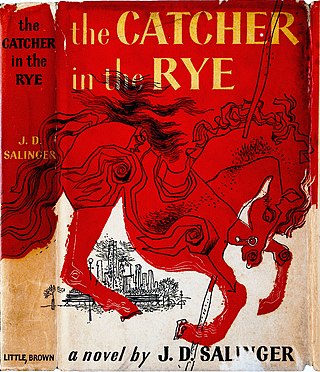
The Catcher in the Rye is a novel by American author J. D. Salinger that was partially published in serial form in 1945–46 before being novelized in 1951. Originally intended for adults, it is often read by adolescents for its themes of angst and alienation, and as a critique of superficiality in society. The novel also deals with themes of innocence, identity, belonging, loss, connection, sex, and depression. The main character, Holden Caulfield, has become an icon for teenage rebellion. Caulfield, nearly of age, gives his opinion on a wide variety of topics as he narrates his recent life events.

The Dunkirk evacuation, codenamed Operation Dynamo and also known as the Miracle of Dunkirk, or just Dunkirk, was the evacuation of more than 338,000 Allied soldiers during the Second World War from the beaches and harbour of Dunkirk, in the north of France, between 26 May and 4 June 1940. The operation commenced after large numbers of Belgian, British, and French troops were cut off and surrounded by German troops during the six-week Battle of France.

Carl Foreman, CBE was an American screenwriter and film producer who wrote the award-winning films The Bridge on the River Kwai and High Noon, among others. He was one of the screenwriters who were blacklisted in Hollywood in the 1950s because of their suspected communist sympathy or membership in the Communist Party.

The Army Game is a British television sitcom that aired on ITV from 19 June 1957 to 20 June 1961. It was the very first ITV sitcom and was made by Granada, and created by Sid Colin. It follows the exploits of Hut 29, a dysfunctional group of soldiers and their National Service conscription into the British Army during the post war years.
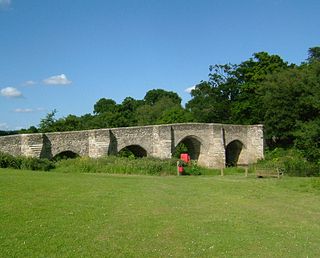
Teston /ˈtiːstən/ or /ˈtiːsən/ is a village in the Maidstone District of Kent, England. It is located on the A26 road out of Maidstone, four miles (6.4 km) from the town centre. There is a narrow stone bridge over the River Medway here.
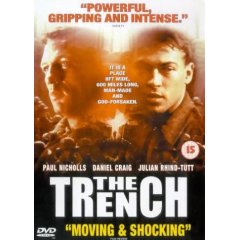
The Trench is a 1999 war film written and directed by William Boyd and starring Paul Nicholls and Daniel Craig. It depicts the experiences of a group of young British soldiers in the 48 hours leading up to the Battle of the Somme in 1916.

The Guns of Navarone is a 1961 action adventure war film directed by J. Lee Thompson from a screenplay by Carl Foreman, based on Alistair MacLean's 1957 novel of the same name. Foreman also produced the film. The film stars Gregory Peck, David Niven and Anthony Quinn, along with Stanley Baker, Anthony Quayle, Irene Papas, Gia Scala, Richard Harris and James Darren. The book and the film share a plot: the efforts of an Allied commando unit to destroy a seemingly impregnable German fortress that threatens Allied naval ships in the Aegean Sea.

London Belongs to Me is a British film released in 1948, directed by Sidney Gilliat, and starring Richard Attenborough and Alastair Sim. It was based on the novel London Belongs to Me by Norman Collins, which was also the basis for a seven-part series made by Thames Television shown in 1977.

George Arthur Woodbridge was an English actor who appeared in films, television, and theatre ranging from the 1930s to the 1970s. Woodbridge's ruddy-cheeked complexion and West Country accent meant he often played publicans, policemen or yokels, most prominently in horror and comedy films alongside Christopher Lee and Peter Cushing.

Massey Shaw is a former London Fire Brigade fireboat, named after the first Chief Officer of the Metropolitan Fire Brigade, Captain Sir Eyre Massey Shaw. Built in 1935 and decommissioned in 1971, the vessel was restored in the early 21st century and is moored in London's West India Docks.

Sir Christopher George Rhodes, 3rd Baronet was an English film and television actor. He was awarded the Croix de Guerre and the United States Legion of Merit for his World War II service.
Dunkirk is a 2004 BBC Television factual about the Battle of Dunkirk and the Dunkirk evacuation in World War II.
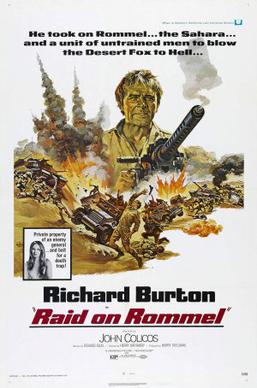
Raid on Rommel is an American B movie in Technicolor from 1971, directed by Henry Hathaway and set in North Africa during the Second World War. It stars Richard Burton as a British commando attempting to destroy German gun emplacements in Tobruk. Much of the action footage was reused from the 1967 film Tobruk, and the storyline is also largely the same.

Weekend at Dunkirk is a 1964 French-Italian drama war film directed by Henri Verneuil and starring Jean-Paul Belmondo. It is based on the 1949 Prix Goncourt winning novel Week-end at Zuydcoote by Robert Merle.
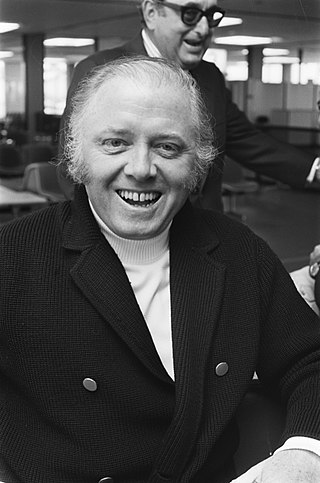
Richard Samuel Attenborough, Baron Attenborough, was an English actor, film director, and producer.
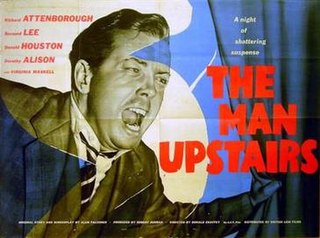
The Man Upstairs is a 1958 British psychological drama film directed by Don Chaffey and starring Richard Attenborough and Bernard Lee. The film was produced by Robert Dunbar for Act Films Ltd.

John Boxer was a British film and television actor. His television appearances included Emergency – Ward 10, Dixon of Dock Green, The Saint, Randall and Hopkirk (Deceased), The Onedin Line and The Life and Times of David Lloyd George.

Dunkirk is a 2017 epic historical war thriller film written, directed and co-produced by Christopher Nolan that depicts the Dunkirk evacuation of World War II from the perspectives of the land, sea and air. It features an ensemble cast comprising Fionn Whitehead, Tom Glynn-Carney, Jack Lowden, Harry Styles in his film debut, Aneurin Barnard, James D'Arcy, Barry Keoghan, Kenneth Branagh, Cillian Murphy, Mark Rylance, and Tom Hardy.
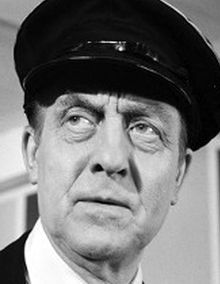
Frank Forsyth, sometimes credited as Frank Forsythe, was an English actor, active from the 1930s. He was born on 19 December 1905 in London, England. He appeared in several TV programmes, including Department S (1969), The Adventures of Black Beauty (1972) and Journey to the Unknown (1968), as well as numerous films. His film appearances include eight of the Carry On films. He died on 2 May 1984 in Poole, England.



















